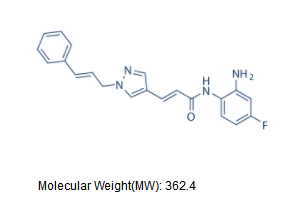Products
RGFP966 1396841-57-8
| 1.Inquiries will be replied within 24 hours |
| 2.We could supply various packages as you required |
| 3.To protect the profit of our agents, price will not show on website, please send inquiries to get the price. |
| 4.Fast delivery, goods arrive your office within 3 to 5 days |
| 5.Please click "Inquiry" or "Email" below to get the price |
 |
|
|
||||||
|
C21H19FN4O |
|
|||||
|
362.4 |
|
in stock | ||||
|
1396841-57-8 |
|
98%+ |
Introduction
RGFP966 is an HDAC3 inhibitor with IC50 of 0.08 μM in cell-free assay, exhibits > 200-fold selectivity over other HDAC
RGFP966 is a slow-on/slow-off, competitive tight-binding HDAC inhibitor, with an IC50 of 0.08μM for HDAC3 and no effective inhibition of any other HDAC at concentrations up to 15μM. RGFP966 treatment on two CTCL cell lines for 24 hours prior to western blot analysis resulted in increased acetylation at H3K9/K14, H3K27, and H4K5, but not H3K56ac. RGFP966 decreases cell growth in CTCL (cutaneous T cell lymphoma) cell lines due to increased apoptosis that is associated with DNA damage and impaired S phase progression. RGFP966 causes a significant reduction in DNA replication fork velocity within the first hour of drug treatment.
Products for scientific research use only
RGFP966 is a slow-on/slow-off, competitive tight-binding HDAC inhibitor, with an IC50 of 0.08μM for HDAC3 and no effective inhibition of any other HDAC at concentrations up to 15μM. RGFP966 treatment on two CTCL cell lines for 24 hours prior to western blot analysis resulted in increased acetylation at H3K9/K14, H3K27, and H4K5, but not H3K56ac. RGFP966 decreases cell growth in CTCL (cutaneous T cell lymphoma) cell lines due to increased apoptosis that is associated with DNA damage and impaired S phase progression. RGFP966 causes a significant reduction in DNA replication fork velocity within the first hour of drug treatment.
Products for scientific research use only






